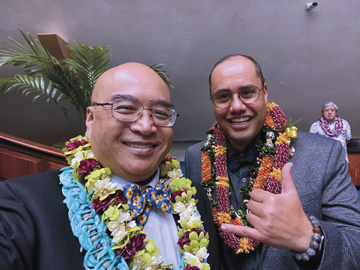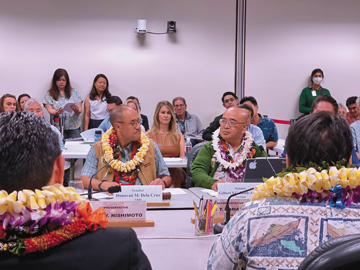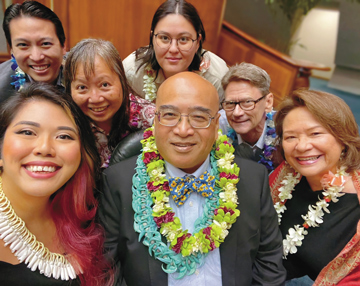
This Legislative Session’s Work
Our local government at work for us.
Gilbert S.C. Keith-Agaran
The Regular Session of the 32nd Legislature closed on Thursday, May 4, 2023 with votes on the State’s two-year budget, HB300 CD1. The main responsibility of the Legislature is to pass a balanced budget (unlike the federal government, Hawai‘i cannot deficit spend). Usually, the House and Senate take final votes on the Tuesday following the end of conference, leaving the final floor day for bills requiring floor amendments and perhaps for more controversial measures that require further debate. This year, the budget was one of the bills pushed over to the final day.
The bills that survived the four-month gauntlet of the session reflect compromises, largely between the lead legislators on those issues. Similarly, HB300 CD1, the State Budget bill crafted by Maui Rep. Kyle Yamashita on behalf of the House (and Wahiawā’s Sen. Donovan DelaCruz for the State Senate), addresses many of the priorities identified when the session opened in January with a new Governor and a Legislature with 18 new members in the House and six new Senators: Housing, Cost-of-Living and Education.
Out-going Governor David Ige left with a proposed status quo budget, leaving much of the agency requests and adjustments for his successor Josh Green to submit as amendments through Governor’s messages (he would send five) during the course of the four months. The Legislature adopted a budget appropriating $11.3 Billion in general tax revenues for FY24 (July 1, 2023–June 30, 2024) and $10.4B in FY25 (July 1, 2024–June 30, 2025). The bill also proposes $2.9B for Capital Improvement Projects (CIP) in FY24 and $1.3B in FY25. Another $40M was reserved for operating and CIP grant-in-aids.

Image courtesy Gil Keith-Agaran
While some House members raised concerns on the final budget—the increased amounts allocated to the Department of Education and University of Hawai‘i were less than what the Governor requested in budget additions—HB300 CD1 provides healthy hikes in early childhood education spending. The budget includes $7,000,000 for expanding the Hawai‘i Keiki: Healthy and Ready to Learn initiative, spearheaded by Lt. Gov. Sylvia Luke. Hāna Elementary and Wailuku Elementary will be among the first schools to be renovated to provide additional public pre-school classrooms.
The Budget provides $38,800,000 in FY25 for the expansion of Preschool Open Doors Programs—allowing existing private operators to include 3-year-olds. The budget also allocates $5,130,000 in FY25 for Charter School early learning programs, $660,000 for the Early Childhood Educator Stipend program, and adds 36.00 permanent positions and $3,949,425 in FY24 and 126.00 permanent positions and $7,641,383 in FY25 for early learning classrooms.
The Legislature also set aside $170,000,000 in FY24 for teacher housing (SB941 CD1). With concerns for mental health increasing, HB300 CD1 includes $5,000,000 for FY24 and FY25 to offer mental health services for public school students.
Along with repair and maintenance projects for the various University of Hawai‘i campuses, the budget also includes adding 3.00 permanent positions and $98,500 in FY24 and $200,250 in FY25 for UH Maui College’s health center. Maui students will also benefit from $3,700,000 in FY24 which continues the Promise Program for Community Colleges.

Image courtesy Gil Keith-Agaran
In response to the ongoing housing challenges faced throughout Hawai‘i, the Legislature appropriated large infusions to the Rental Housing Trust Fund ($100M in FY24 and $180M in FY25) and the Dwelling Unit Revolving Fund ($50M) which assist with the development of affordable housing. Rep. Yamashita’s bill HB1363 CD1 will also provide the County of Maui a final chance to adopt a General Excise Tax (GET) surcharge for housing infrastructure (the other three counties already have GET surcharge ordinances—Honolulu for rail and Kaua‘i and Hawai‘i island for transportation). That measure also allows Kaua‘i and Hawai‘i to amend their GET surcharge to its use for housing infrastructure on their islands as well as transportation.
The Legislature largely agreed with the Governor’s homeless initiatives but decided to maintain ‘Ohana Zones for transitional housing proposals while also funding Kauhales (small homes) separately. The budget includes 8.00 permanent positions and $1,000,000 in FY24 and $920,000 in FY25 for the Office on Homelessness and Housing Solutions, $15,000,000 in FY24 for the ‘Ohana Zones Pilot Program, and $15,000,000 in FY24 and $33,000,000 in FY25 for Kauhale Projects across the State.
The Legislature also continued to address the cost-of-living for working families. HB 954 CD1 provides Hawai‘i working families tax credits for child and household care, doubling of the earned income tax credit, and increases the refundable food/GET tax credit. My bill SB1437 CD1 (a companion to Rep. Yamashita’s measure) will allow locally owned business full deductions of state and local taxes (SALT) on their federal income taxes by allowing them the option to pay at the entity level.
With all politics being local, the delegation also worked on issues of interest in Maui County. The State Budget includes $39.7M for Maui Health Systems for capital improvement projects over the two years and a $22M operating subsidy. Maui Rep. Troy Hashimoto’s HB353 CD1 expands the bridge program at UH Maui College for training and educating certified nurses aides as licensed practical nurses—something that will help long-term care facilities like Hale Makua with staffing shortages that have limited its ability to take in more patients (and to accept patient transfers from Maui Memorial Medical Center).
In what many health care providers, including the local hospitals, believe is a game changer, the Legislature passed SB674 CD1 to adopt the Interstate Medical Licensure Compact which will streamline the recruitment of medical providers with out-of-state licenses. The Governor earlier in the session signed a shield law to protect reproductive rights of Hawai‘i medical providers and patients (Act 2 2023—SB1 SD2). While a bill to exempt services to Medicaid patients did not make it, the State Budget allocates $30M in FY24 and FY25 towards increased reimbursements for medical service providers for Medicaid patients.

Image courtesy Gil Keith-Agaran
My bill SB1064 SD1 creates a grant program in the Department of Land and Natural Resources to assist landowners with dam improvements or removal—for example, the homeowners association at Waikapu Gardens that now own a plantation era reservoir along Waiale Drive. The Legislature also included $6.1M for the Maui Axis deer program in both FY24 and FY25. At the request of Maui Emergency Management Agency Director Herman Andaya, I introduced SB1163 CD1 which restores funding for the Civil Air Patrol units throughout the State.
Another of my proposals, SB1076 CD1, will require the Office of Election to provide a digital voter guide for the next election. It was one of the bills reforming election and ethics laws that passed this session.
With the session concluded, Governor Green will have until June 26, 2023 to review and then provide notice of possible vetoes and must deliver his vetoes by July 11, 2023. The House and Senate would need to re-convene on July 11, 2023 to consider any veto overrides.
Finally, Maui County will benefit from CIP and grant-in-aid awards important for our schools, public operations and non-profits:
Central Maui Public Works Projects:
• $9M Kahului Civic Center mixed used development (adjacent to the County bus hub)
• $1M Wailuku Civic Center planning
• 37.7M Kahului Airport improvements, including a new TSA check point
• $2.5M for PFAS spill soil remediation at Kahului Airport Aircraft Rescue and Fire Fighting Training Pit
• $217K Naniloa Drive Bridge rehabilitation
• $5M Pu‘unēnē Avenue widening from Kamehameha Avenue to Kuihelani Highway
• $25M for Baldwin High School athletic facilities
• $150K for ‘Īao Intermediate for expansion of its campus
• $650K for Lihikai Elementary for communication and electrical upgrades
• $2.5M for Maui High School track and field improvements
• $650K for Pōmaika‘i Elementary for playfield improvements
• $300K for Pu‘u Kukui Elementary plans and designs for expanded portion of its campus
• $10M for new Central Maui Intermediate and Elementary School (Waikapū) for plans and design
• $35M for Kahului Harbor improvements
• $701K for Kanahā Pond Wildlife Sanctuary fencing replacement
• $300K for Hoapili Hale (Court House) improvements
• $23.5M for new Waikapū Wastewater Treatment Facility
Other Public Works Projects for Maui County:
• $1.25M Flood Prevention & Mitigation at Kūlanihāko‘i and Waipu‘ilani Gulch
• $400K for Kula Forest Trail Repair
• $700K for West Maui tree snail fencing
• $10M for Upcountry Agricultural Park
• $2M Molokai Irrigation improvements
• $8.51M Molokai complex schools
• $7.5M Lāna‘i high and elementary school
• $875M Kamehameha III
• $7M Kula (Kēōkea campus) Elementary
• $3.2M Mala Wharf
• $4M Lahaina Harbor Pier
• 1.02M Lokelani Intermediate School
• $1.3M Hāna High & Elementary
Grant-In-Aids for Maui Non-Profits:
• $150K Alexander & Baldwin Sugar Museum
• $250K Aloha House, Inc.
• $345K Arc of Maui County
• $300K Boys and Girls Club of Maui
• $300K Hale Kipa
• $140K Hale Makua
• $500K Hāna Health
• $450K Imua Family Services
• $700K J Walter Cameron Center
• $50K Kimokeo Foundation
• $20K Lāna‘i Academy of Performing Arts
• $400K Maui Academy of Performing Arts
• $600K Maui Arts and Cultural Center
• $400K Maui Economic Development Board
• $150K Maui Humane Society
• $200K Maui Family YMCA
• $75K Pacific Cancer Foundation
• $500K Waiohuli Homesteaders Association
Later this summer, the Senate will convene in Special Session to consider the Governor’s nominees for two vacancies on the Hawai‘i Supreme Court. And in January 2024, the Legislature will convene for the second session of the 32nd Legislature.
 Gilbert S.C. Keith-Agaran represents Central Maui in the State Senate. He serves as Vice Chair of the Senate Ways and Means Committee.
Gilbert S.C. Keith-Agaran represents Central Maui in the State Senate. He serves as Vice Chair of the Senate Ways and Means Committee.
